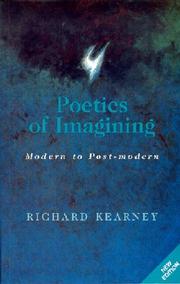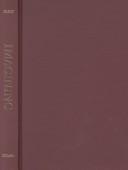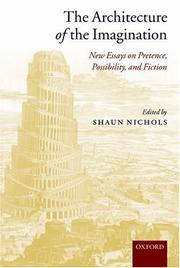| Listing 1 - 10 of 87 | << page >> |
Sort by
|
Book
ISBN: 9782705693206 Year: 2017 Publisher: Paris : Hermann,
Abstract | Keywords | Export | Availability | Bookmark
 Loading...
Loading...Choose an application
- Reference Manager
- EndNote
- RefWorks (Direct export to RefWorks)
A une époque où la thématique de l'imaginaire est (re)devenue omniprésente dans beaucoup de disciplines, au prix peut-être d'une banalisation et d'une usure sémantique et épistémologique, cette décade inédite, tenue à Cerisy en 1978, se révèle, trente-six ans après, dotée d'une pertinence et d'une acuité exceptionnelles. Loin d'être anachroniques ou d'être une simple archive, les actes de ce colloque se présentent comme profondément ancrés dans de solides problématiques, plus que jamais actuelles, abordant avec précision des questions majeures de l'imaginaire, confirmant ainsi le bien-fondé du sujet et la clairvoyance des organisateurs, Maurice de Gandillac et Wanda Bannour, auxquels ce volume rend par-là hommage.

ISBN: 0823218716 0823218724 Year: 1998 Publisher: New York : Fordham University Press,
Abstract | Keywords | Export | Availability | Bookmark
 Loading...
Loading...Choose an application
- Reference Manager
- EndNote
- RefWorks (Direct export to RefWorks)
What is Imagination? What is the relationship between aesthetics and ethics in a contemporary civilization dominated by the image? How can we reconcile the right to imagine with the right to justice? Are the claims of artistic creativity and moral responsibility compatible?With an extended foreword and an afterword chapter, and fascinating new material on the narrative imagination, Poetics of Imagining: Modern to Post-modern provides a critically developed and accessible account of the major theories of imagination in modern European thought. It analyses and assesses the decisive contributions made to our understanding of the imaginary life by phenomenology (Husserl, Sartre, Merleau-Ponty, Bachelard), hermeneutics (Heidegger, Ricoeur), and post-modernism (Vattima, Kristeva, Lyotard). Richard Kearney achieves this with a coherent and committed approach, which displays his own passionate concern for the claims of imagination in our post-modern world of fragmentation and fracture.This is essential reading for those interested in current leading debates on the role of imagining in continental philosophy, ethics, psychoanalysis, art theory and literary criticism.
Book
ISBN: 9782376150541 237615054X Year: 2018 Publisher: Paris: Manitoba,
Abstract | Keywords | Export | Availability | Bookmark
 Loading...
Loading...Choose an application
- Reference Manager
- EndNote
- RefWorks (Direct export to RefWorks)
Si l'imagination au pouvoir était un slogan, cet ouvrage montre qu'il peut être une réalité. Près d'une quarantaine de personnalités exceptionnelles ont accepté de partager leur relation avec l'imagination dans leurs domaines respectifs. Qu'ils soient astronaute, philosophe, cyborg, militant écologiste, mathématicien, anthropologue, acteur, astrophysicien, ou encore chanteur, tous se retrouvent autour de la puissance de l'imagination, elle qui leur a permis d'accomplir des choses hors norme. Le goût d'imaginer sa vie est l’œuvre collective de femmes et d'hommes d'horizons divers qui construisent la société du futur, à la force de leur imagination. Une telle concentration de personnalités mondialement reconnues dans leur domaine est une première dans un ouvrage collectif. Qu'ils soient français, chinois, anglais, suisses, canadiens, américains, irlandais, belges, danois, algériens ou singapouriens, ces 40 penseurs nous confient ici leur vision de l'imagination par leur parcours et leur expérience. Ils ne nous offrent pas un chemin tracé, ils nous montrent l'existence des chemins.
Book
Year: 2018 Publisher: Göttingen : Konstanz University Press,
Abstract | Keywords | Export | Availability | Bookmark
 Loading...
Loading...Choose an application
- Reference Manager
- EndNote
- RefWorks (Direct export to RefWorks)
Kant's reflections on animals open up a hitherto overlooked approach to his conception of human intuition and imagination. In her book, Rahel Villinger shows how Kant's aesthetics, epistemology, and theory of history become completely readable against the background of the assumption of animal cognition through intuition and imagination. Kant as a frigid thinker of human reason, who sees in the forces of sensuality nothing but immorality and animal lethargy: this prejudice is still widespread. In fact, sensuality for Kant is an intrinsic and independent faculty of knowledge through intuition and imagination. Kant radically upgraded sensuality, which was independent of reason, from the rationalistic school philosophy of his day and also against the newly emerging philosophy of German idealism. We need the imagination of other animals to be able to think our own and to critically push the boundaries. Therefore, an imagination of animals with Kant includes both: the notion of a superhuman power of purely sensual intuition and imagination whose singularity and immediacy reflect the perfection and infinity of divine intuition; and the specific imagination of rational animals, whose descriptive activity combines image and writing, vividness and concept, and which becomes possible only through the imagination of their premature origin - their animal prototype. The guide to his reflections on animals thus reveals a hidden ambiguity in Kant's thinking of sensual nature, which determines the foundations of modern aesthetics, poetics, and pictorial theory.
Book
ISBN: 9780415739481 9781315657905 9781317329435 9781317329442 9781138574076 Year: 2016 Publisher: London Routledge
Abstract | Keywords | Export | Availability | Bookmark
 Loading...
Loading...Choose an application
- Reference Manager
- EndNote
- RefWorks (Direct export to RefWorks)
"Imagination occupies a central place in philosophy, going back to Aristotle. However, following a period of relative neglect there has been an explosion of interest in imagination in the past two decades as philosophers examine the role of imagination in debates about the mind and cognition, aesthetics and ethics, as well as epistemology, science and mathematics. This outstanding Handbook contains over thirty specially commissioned chapters by leading philosophers organized into six clear sections examining the most important aspects of the philosophy of imagination, including: Imagination in historical context: Aristotle, Descartes, Hume, Kant, Husserl, and Sartre; What is imagination? The relation between imagination and mental imagery; imagination contrasted with perception, memory, and dreaming; Imagination in aesthetics: imagination and our engagement with music, art, and fiction; the problems of fictional emotions and 'imaginative resistance;' Imagination in philosophy of mind and cognitive science: imagination and creativity, the self, action, child development, and animal cognition; Imagination in ethics and political philosophy, including the concept of 'moral imagination' and empathy; Imagination in epistemology and philosophy of science, including learning, thought experiments, scientific modeling, and mathematics." -- Publisher's descriptionImagination occupies a central place in philosophy, going back to Aristotle. However, following a period of relative neglect there has been an explosion of interest in imagination in the past two decades as philosophers examine the role of imagination in debates about the mind and cognition, aesthetics and ethics, as well as epistemology, science and mathematics. This outstanding Handbook contains over thirty specially commissioned chapters by leading philosophers organised into six clear sections examining the most important aspects of the philosophy of imagination, including: Imagination in historical context: Aristotle, Descartes, Hume, Kant, Husserl, and Sartre What is imagination? The relation between imagination and mental imagery; imagination contrasted with perception, memory, and dreaming Imagination in aesthetics: imagination and our engagement with music, art, and fiction; the problems of fictional emotions and `imaginative resistance' Imagination in philosophy of mind and cognitive science: imagination and creativity, the self, action, child development, and animal cognition Imagination in ethics and political philosophy, including the concept of 'moral imagination' and empathy Imagination in epistemology and philosophy of science, including learning, thought experiments, scientific modelling, and mathematics. The Routledge Handbook of Philosophy of Imagination is essential reading for students and researchers in philosophy of mind and psychology, aesthetics, and ethics. It will also be a valuable resource for those in related disciplines such as psychology and art.
Philosophical anthropology --- Imagination (Philosophy) --- Imagination (Philosophy). --- Philosophy of mind --- History.
Book
ISBN: 2711616231 9782711616237 Year: 2003 Publisher: Paris : Vrin,
Abstract | Keywords | Export | Availability | Bookmark
 Loading...
Loading...Choose an application
- Reference Manager
- EndNote
- RefWorks (Direct export to RefWorks)
Imagination (Philosophy) --- Imaginaire (Philosophie) --- Imagination (philosophie)
Book
ISBN: 1554410215 Year: 2002 Publisher: Chicoutimi, Quebec : J.-M. Tremblay,
Abstract | Keywords | Export | Availability | Bookmark
 Loading...
Loading...Choose an application
- Reference Manager
- EndNote
- RefWorks (Direct export to RefWorks)
Imagination (Philosophy) --- Thought and thinking. --- Comprehension.

ISBN: 9780253214157 0253214157 0253338026 Year: 2000 Publisher: Bloomington: Indiana university press,
Abstract | Keywords | Export | Availability | Bookmark
 Loading...
Loading...Choose an application
- Reference Manager
- EndNote
- RefWorks (Direct export to RefWorks)
Drawing on his own experiences of imagining, Edward S. Casey describes the essential forms that imagination assumes in everyday life. In a detailed analysis of the fundamental features of all imaginative experience, Casey shows imagining to be eidetically distinct from perceiving and defines it as a radically autonomous act, involving a characteristic freedom of mind. A new preface places Imagining within the context of current issues in philosophy and psychology.
Imagination (Philosophy) --- Phenomenology --- Imagination --- Philosophy --- Imagination. --- Phenomenology.

ISBN: 0199275734 0199275726 9780199275724 9780199275731 0191706108 Year: 2006 Publisher: Oxford Clarendon
Abstract | Keywords | Export | Availability | Bookmark
 Loading...
Loading...Choose an application
- Reference Manager
- EndNote
- RefWorks (Direct export to RefWorks)
'The Architecture of the Imagination' will be an essential resource for the growing number of philosophers and psychologists studying the nature of the imagination and on its role in philosophy, aesthetics, and everyday life.
Metaphysics --- Theory of knowledge --- Imagination (Philosophy). --- Imagination (philosophie) --- Imagination (Philosophy) --- Philosophy
Book
ISBN: 2905525037 Year: 1986 Publisher: Paris : Radio France,
Abstract | Keywords | Export | Availability | Bookmark
 Loading...
Loading...Choose an application
- Reference Manager
- EndNote
- RefWorks (Direct export to RefWorks)
Historians --- History --- Imagination (Philosophy) --- Interviews. --- Philosophy. --- Imagination (Philosophy). --- Interviews --- IMAGINATION --- FRANCE --- HISTORIOGRAPHIE
| Listing 1 - 10 of 87 | << page >> |
Sort by
|

 Search
Search Feedback
Feedback About UniCat
About UniCat  Help
Help News
News